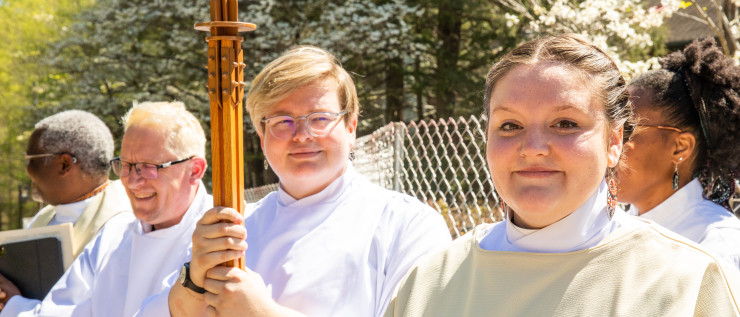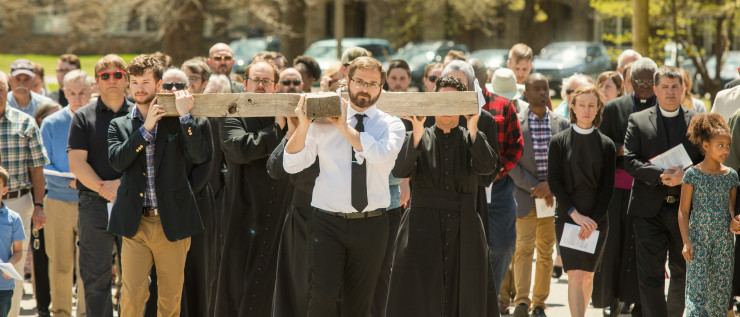The Rev. Richard Cogill brings a distinctive perspective to his work as the School of Theology’s director of contextual education. “Sewanee is not disconnected from ‘the real world,’ as some have said. People everywhere have the same yearning for God,” Cogill says. “For our process in contextual education, there is an ongoing conversation between theory and practice. It’s not as though our students are being prepared in seminary and then—only after they graduate—they’re sent out into the real world. They are constantly testing and reflecting on the challenges of the surrounding communities and the parishes they serve when they are in the classroom.”
Contextual education at the School of Theology includes courses on congregational dynamics, parish leadership, and parish and community engagement. The addition of a third unit of field education has allowed many students to learn and serve in more than one placement.

The Rev. Suz Southern, T'23, is pictured with classmates while serving as Deacon At a Bilingual Holy Eucharist.
“The needs of the students and what the students bring to the classroom are always shaping the curriculum,” he says. “It’s always evolving. For example, a student raised the question of ministry and mental health—recognizing and engaging trauma, partnering with other professionals. Those elements get incorporated into an evolving framework of contextual education so that these students—these practitioners—are adequately prepared for ministry wherever they may go.”
Forming priests, however, involves much more than teaching them the practical techniques and skills of ministry. “I try to be keenly aware of the individual student’s needs,” Cogill says. “In one upcoming assignment, students are tasked with writing about their own leadership style. Are they collaborative? A dictator? But their field education mentors will also write how they perceive them, so that their self-perceptions can be tested, and we can address whatever their blind spots may be.”
While the School of Theology prides itself on its academics, Cogill makes sure that his students’ classwork isn’t happening in a vacuum. “When students come here, it is with an embedded theology—things they’ve inherited or lived. I push them to unpack that, to take a more deliberative approach, to constantly discern how God is showing up in a very particular context. Who is God for the persons entrusted to you, and who is God for you? I want students to engage in intentional theological reflection to open them up to possibility rather than rigid attachment to some commonly held belief.”

Seminarians join the Stations of the Cross procession on Good Friday 2022.
But that deliberative and intentional approach always leads back to the lived experience. “At the center of every class is this question: Who is God for you? People struggle with that,” Cogill says. “There’s no right or wrong answer, but there is your answer. If you don’t know, other people will determine that answer for you. And then, instead of a living, breathing, reality, you have a God of only intellectual assent, you get burned out, and your calling becomes merely a job.”
Under Cogill’s tutelage, the School’s Contextual Education program involves much more than teaching the basic requirements for the “job” of parish priest. “My primary concern is that I am forming holy and whole and self-aware individuals, ready and accountable for an ongoing encounter with the living God.”
